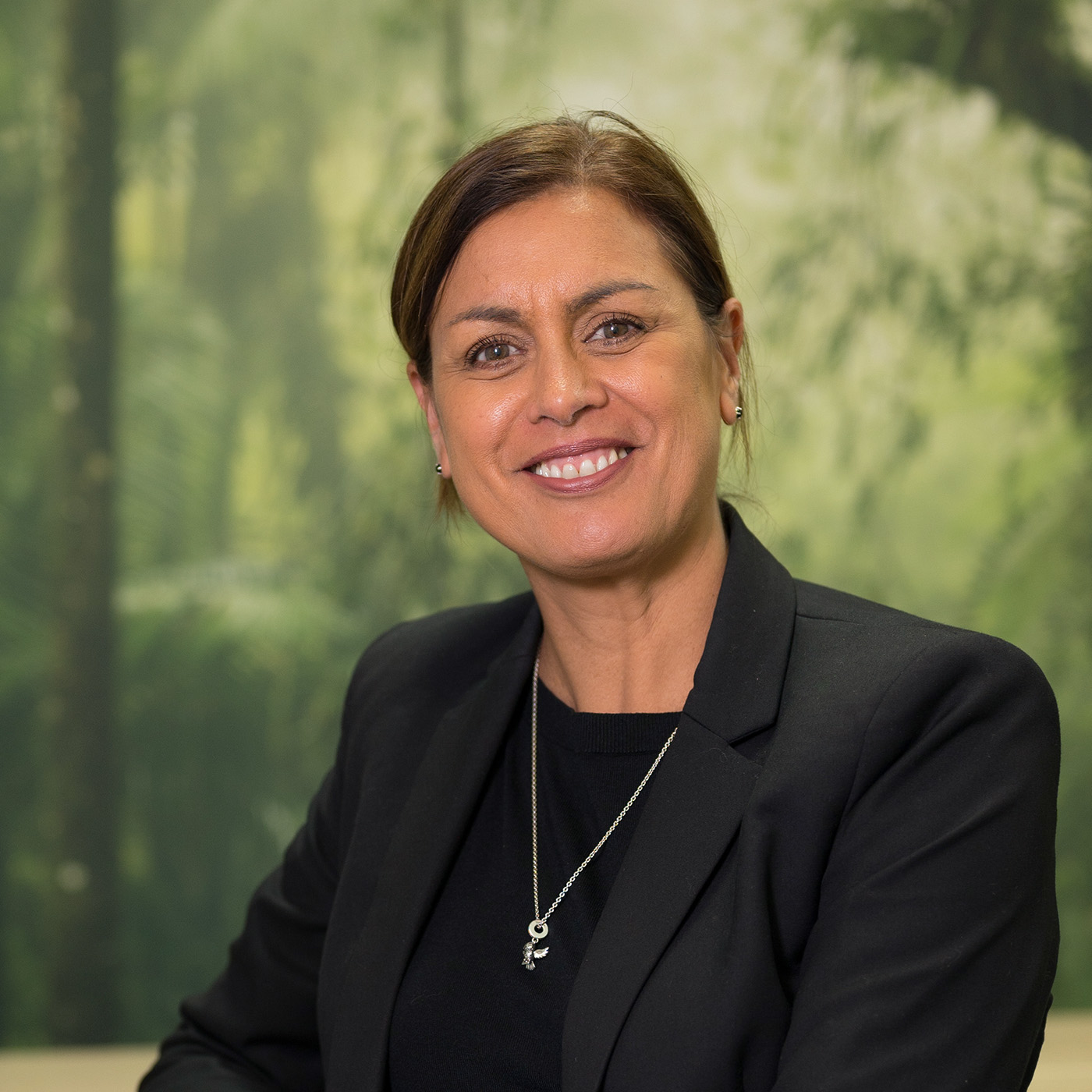Alumni News
Alumni News
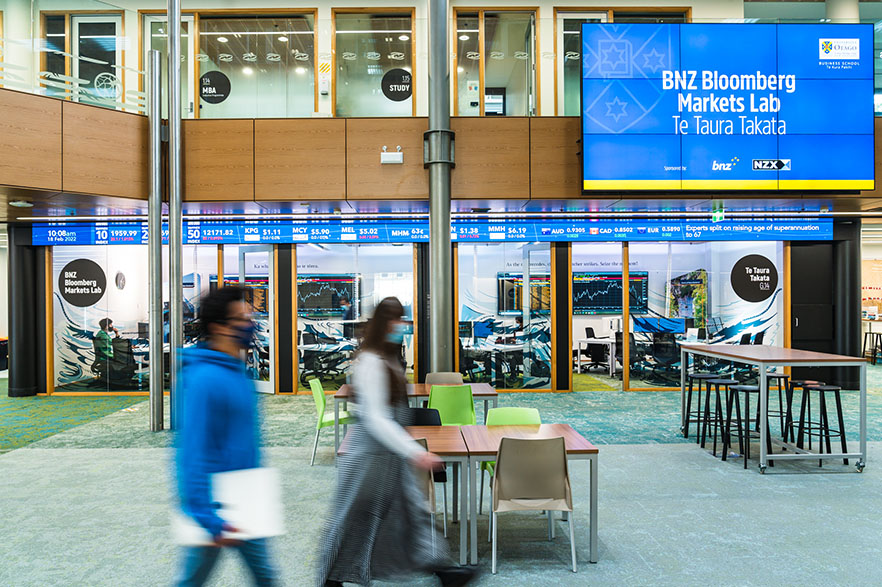
The newly built BNZ Bloomberg the Bloomberg Lab. Markets Lab Te Taura Takata in the Otago Business School.
Photo: Dave Bull.
New trading lab builds on enduring heritage
Alumni connections are literally in the foundations of the newly-built BNZ Bloomberg Markets Lab Te Taura Takata.
Situated on the ground floor of the Otago Business School (OBS), the state-of-the-art trading lab will provide students and faculty with access to real-time and historical financial data, news and analysis.
With 12 Bloomberg Professional terminals, it is one of the largest academic trading labs in New Zealand and will be used extensively in Investment, Behavioural Finance, Corporate Finance and Banking courses.
The Lab is the first trading room in the country to include a cultural narrative in its design which reflects the historical importance of the site to both Māori and settlers. Before the extensive land reclamation around Otago Harbour Te Awa Moana Ōtākou, the setting of the OBS would have overlooked the water.
“The harbour has always been rich in resources and underpinned significant economic activity. It is where, in the early 1800s, local Kāi Tahu traded pigs, flax, potatoes and other resources with European sealers and whalers,” says Jennie Henderson, Prospect Researcher in the Development and Alumni Relations Office.
The 1848 Scottish Free Church settlers also traded with Kāi Tahu nearby, in the present-day Exchange area. Later, as the location of the Bank of New Zealand (BNZ) and the Stock Exchange, along with other banks and businesses, this area was the economic centre of early Dunedin.
Gifted the name Te Taura Takata (The Ties That Bind) by the University's Office of Māori Development, the design elements of the Lab illustrate the past, present and future significance of the room.
Artist Madison Kelly (Kāi Tahu, Kāti Māmoe) says “the design for this trading space speaks to a meeting of two fishing lines – one of iron and one of bone – across a dynamic whakapapa of moana, whenua, kaimoana and people”.
The Lab also continues historical connections between the University and BNZ and New Zealand Stock Exchange (NZX).
Originally intended as Dunedin's post office, the Stock Exchange building in Princes Street became the first home of the University in 1871. When the University outgrew the premises in 1877, it was taken over by the Colonial Bank, which was subsequently taken over by BNZ in 1895.The building was then sold to a syndicate of Dunedin stockbrokers in 1899 and became known as the Stock Exchange building.
“The design for this trading space speaks to a meeting of two fishing lines – one of iron and one of bone – across a dynamic whakapapa of moana, whenua, kaimoana and people.”
In 1869, at the first University Council meeting, it was agreed BNZ would be the bank of the Council and, since then, the bank has contributed generously to the University through grants and scholarships.
“The sponsorship from BNZ and NZX and other donors is greatly appreciated and has made the establishment of this Lab a reality,” says Graeme Mullin, Development Manager at OBS.
NZX Director Nigel Babbage can claim a special relationship with the new Lab. As a Chemistry and Economics student in the 1980s, Nigel lived in a flat on Clyde Street that was situated right where the current Business School now stands.
He says NZX is delighted to be involved with the new trading lab project.
“It's great that the students have the interconnectivity with markets now, that state-of-the-art technology is at the disposal of the next generation of graduates.”
NZX Chair of Board of Directors, James Miller, is also an Otago graduate.
BNZ's General Manager of Māori Business, Rēnata Blair says BNZ and the University have enjoyed a long association, with BNZ opening its first Dunedin branch in December 1861.
“BNZ is incredibly proud of the inclusion of the Māori motif and design that reflects the historical significance of the site. It reflects the sense of place in the trading centre and we commend the University of Otago for its integration of Māori design.
“Embracing the iwi narrative ensures the future leaders of our economy who use this lab will have an awareness of the rich history of Māori in its origins. It recognises the importance of Māori to the Ōtākou area and acknowledges the local Kāi Tahu iwi who continue to play a key role in the current and future social, cultural and economic life of the South Island.”
Otago alumni in leadership roles at BNZ include Philippa Fourbet, current General Manager BNZ Markets and Charles Roberts, who held a number of senior positions at the bank.
Pro-Vice-Chancellor and OBS Dean, Professor Robin Gauld, says it is powerful to see the relationships of the past leading to the development of this space in the present.
“The Otago Business School hopes that all who engage with the space, step away having learnt about the site's historical importance, as well as having gained knowledge that can equip them for the future.”

Students work in the new BNZ Bloomberg Markets Lab Te Taura Takata.
Photo: Dave Bull.
Time capsule lives on
A donation by BNZ in 1974 led to the redevelopment of the University's Union St Bridge into a piazza. A plaque was put in place by the bridge and a time capsule was buried nearby.
In 2016, contractors working on the University landscaping project unearthed the capsule. A glimpse inside revealed:
- Dunedin North Branch's Centennial Booklet
- University of Otago's Medical School's centenary history
- A copy of the University's 1974 Calendar
- A copy of the student roll
- A copy of the bank's latest (1974) Annual Report
- Newspaper clippings relative to the gift to the University
The capsule now lives in a display case outside the Bloomberg Lab.
Supporting freshwater sciences
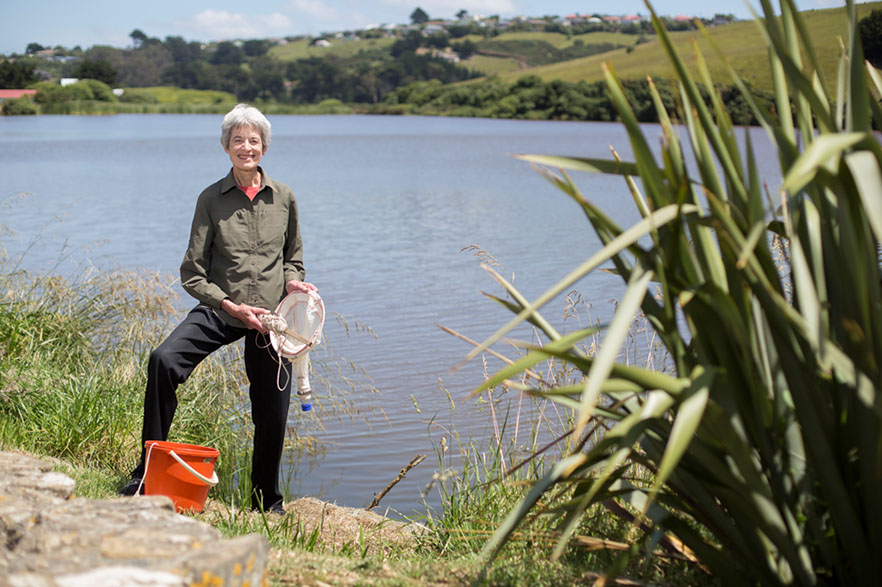
EMERITA PROFESSOR DAME CAROLYN BURNS: “… it is critical we acknowledge the value of our freshwater ecosystems with research-informed conservation and management strategies. We have to do that now; we can't wait any longer.”
A new Professorial Chairin Freshwater Sciences, initiated and supported by a substantial gift from Emerita Professor Dame Carolyn Burns CBE, is being established at the University of Otago.
Dame Carolyn has made an initial gift of $1 million to the Otago Foundation Trust and will make further annual gifts over the coming years to support the endowment for the Chair, which has been established in her name. At the same time, the University will actively begin fundraising to match Dame Carolyn's gift, creating an endowment fund of approximately $5 million which will ensure the Chair can be funded in perpetuity.
Dame Carolyn is a leading international authority on the ecology of lakes and was made a Dame Companion of the New Zealand Order of Merit in the 2021 Queen's Birthday Honours for services to ecological research.
She has a long association with the University of Otago, beginning in 1969 when she started work as a Lecturer in the Department of Zoology. She was Head of Department from 1998 to 2005, and continues to tutor fourth-year students, supervise PhD students and undertake research.
Dame Carolyn says the need to protect and manage our abundant freshwater ecosystems has never been more urgent, and this is behind her decision to support the establishment of the Chair in Freshwater Sciences.
“Our lakes, rivers and wetlands play a vital role in our economy, underpinning and sustaining agriculture and horticulture. They also play a central role in recreation and in our tourism industry, and of course in the health and welfare of New Zealanders by providing fresh water that is readily available for drinking,” she says.
“We have taken our freshwater systems for granted for too long. Now, with increasing population size, increasing land development and climate change, it is critical we acknowledge the value of our freshwater ecosystems with research-informed conservation and management strategies. We have to do that now; we can't wait any longer.”
Dame Carolyn says the idea behind the new Chair is to provide and develop both research and leadership in the area of Freshwater Sciences, and by doing so help to maintain, enhance, and protect freshwater ecosystems into the future.
“The Chair has two aspects to it – research and teaching. You have a professor who inspires and leads students in research thereby building skills and knowledge, and who has a role also in teaching and in communications with the wider public.”
Head of the Department of Zoology, Professor Gerry Closs, says Dame Carolyn's gift comes at a key moment for the management of freshwaters in New Zealand and will ensure Otago remains at the forefront of teaching and research in this area.
“Dame Carolyn's legacy of scholarship and leadership at Otago is immense and has been of tremendous benefit to New Zealand and globally,” says Closs. “Her wonderfully generous gift will create new and exciting opportunities to continue and extend that legacy into the future, addressing the many challenges that we face with respect to sustainable management of our freshwater ecosystems.”
Dame Carolyn's pioneering research on the ecology of zooplankton has underpinned much of the modern theory of lake biomanipulation, whereby lake food webs are managed to maintain water quality and lake health.
For her research, she was awarded the International Limnological Society's Naumann-Thienemann Medal in 2007; the New Zealand Freshwater Sciences Medal in 2013; the Marsden Medal, awarded by the NZ Association of Scientists in 2017; and the Thomson Medal, awarded by the Royal Society Te Apārangi in 2018.
Dame Carolyn also served as Chair of the Nature Conservation Council from 1978-1983 and was a member of the National Parks and Reserves Authority until 1990.
She was a regional councillor of the World Conservation Union (IUCN) from 1984 to 1990 and chaired the New Zealand committee of IUCN members from 1986 to 1990. She was a member of the Board of Directors of the National Institute of Water and Atmospheric Research; the Board of Antarctica New Zealand; and the first female President of the International Limnological Society from 1995 to 2001.
In 1984 she was awarded a CBE (Commander of the British Empire) for services to conservation, in 1993 was made a Fellow of the Royal Society of New Zealand and from 2003-2006 was President of the Academy Council of Fellows of the Royal Society of New Zealand.
In 2020, Dame Carolyn made a gift to the Otago Foundation Trust to endow the Carolyn Burns 50th Anniversary Visiting Fellowship in Freshwater Sciences.
Pūtea Tautoko recognised at fundraising awards
Pūtea Tautoko, the University's student hardship fund, was “Highly Commended” in the Best Individual Giving category at the virtual Fundraising Institute of New Zealand (FINZ) 2021 Awards. The awards, for achievements in 2020, were presented online in late March, after several delays due to COVID-19.
Pūtea Tautoko has become the largest student financial support initiative in Otago's history. Including donations, University budget allocations, and emergency Government funding, it grew to $4.1 million in 2020 and was fully used to support nearly 2,600 students.
Development and Alumni Relations Office (DARO) Director Shelagh Murray says Pūtea Tautoko aimed to keep students studying and able to pay their bills through easy and quick access to emergency funding.
“Pūtea Tautoko is the largest fund of its type ever launched by Otago and moved quickly from the drawing board to an active fund, disbursing support to students in need. It greatly raised the profile of philanthropy to staff and students, and our global community of alumni and friends. As such, it both typified and exemplified the University's wider student-focussed response to the COVID-19 pandemic.”
Trailblazers celebrated in 20Twenties Young Alumni Awards
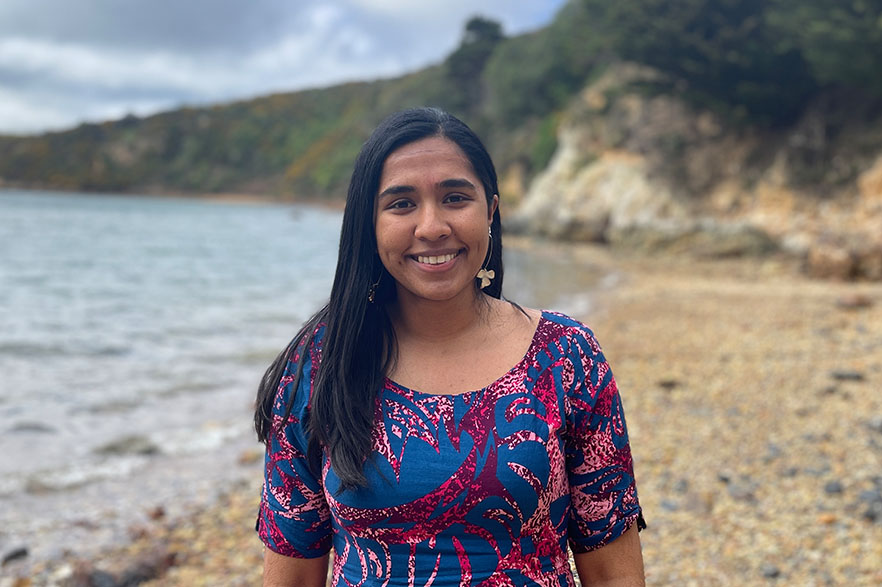
ONE OF OTAGO'S 2021 20TWENTIES AWARD RECIPIENTS NAMRATA CHAND: “It ... means being part of the community of alumni who are using their education to make a difference to their communities.”
An inspirational group of 20 young Otago alumni have been recognised in this year's 20Twenties Young Alumni Awards.
From around New Zealand and as far afield as Sydney and California, these young graduates are making their mark in their diverse communities and workplaces, in professional, volunteer and leadership roles.
The award recipients are drawn from all Divisions of the University and are recognised for their contribution to a wide range of areas, including: giving marginalised groups and minorities a voice; providing key advice on climate change policy; stepping into rural leadership roles; working to improve Māori and Moana Pacific peoples' health outcomes and forging a career in high performance sport.
Receiving a 20Twenties award for her leadership in improving climate resilience in communities, BAppSc graduate Namrata Chand says she was overjoyed to hear she had been named a 20Twenties recipient.
“The award means a lot to me,” says Chand. “It means being recognised for the roles, organisations and communities I was able to serve due to my education pathway at the University of Otago. It also means being part of a community of alumni who are using their education to make a difference to their communities.”
After graduation, Chand returned to Fiji, where she worked in a variety of marine science and climate change roles. At the same time, she pursued a master's degree in Environmental Science from the University of the South Pacific and is now back at Otago undertaking a PhD in the field of marine science, focusing on seaweeds.
Recipients of the 20Twenties Young Alumni Awards for 2021:
- Benjamin Abraham, BA(Hons)
- Arina Aizal, BA
- Joshuaa Alefosio-Pei, BSc
- Umi Asaka, BSW
- Jay Barrett, BSc
- Katie Batterton, BSc
- Cameron Burrow, BCom
- Namrata Chand, BAppSc
- Breen Cowie, BCom
- Caitlin Helme, BA(Hons)
- Maddi Ingham, BCom, LLB
- Emma Jefferies, BDS
- Thomas Kindley, BPhEd
- Mary Jane Kivalu, BCom, MBA
- Calum Rickard, BSc (Hons)
- Diana Shaul, BPharm
- Tisiola Talalima, BBiomedSc
- Rachel Tombs, BA(Hons)
- Hanna Van der Giessen, BSc(Hons), MHealSc
- Hamid Zawari, BSc
Understanding, tolerance and generosity at heart of gift
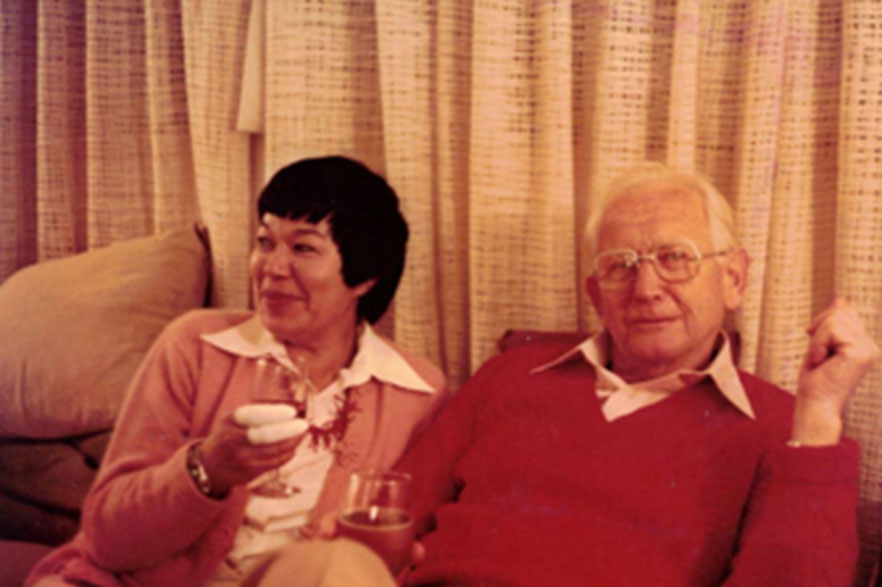
Mrs Ngaere Geddes and Professor Bill Geddes (mid-1970s).
A generous gift from the late Mrs Ngaere Geddes and her husband, renowned anthropologist and Otago alumnus Professor Bill Geddes, will provide invaluable support for students of Social Anthropology at Otago.
Mrs Geddes, who died in February 2020, left $1.3 million in her estate to establish an endowment, The Professor W. R. Geddes Bequest, to provide funding in perpetuity for scholarships for postgraduate Social Anthropology students. Professor Geddes died in 1989. The funds will be administered by the Otago Foundation Trust, with the first scholarships to be awarded in 2023.
Dr Greg Rawlings, Social Anthropology's Head of Programme, says the Programme is honoured to have received this incredibly generous endowment. The bequest will support students with fieldwork, research and writing on projects that resonate with Professor Geddes' vision of the discipline around the world.
“This transformative bequest will allow our postgraduate scholars and students to continue to advance anthropological knowledge with the rigour, commitment and enthusiasm that the Geddes' embraced over many decades of research and service.”
“This transformative bequest will allow our postgraduate scholars and students to continue to advance anthropological knowledge with the rigour, commitment and enthusiasm that the Geddes' embraced over many decades of research and service.”
Professor Geddes was born in New Plymouth in 1916 and graduated from Otago with a BA in 1938 and an MA in 1939, majoring in Philosophy and Psychology.
After serving in WWII in the Second New Zealand Expeditionary Force, he completed a PhD at the University of London in the UK, writing his thesis at the London School of Economics and Political Science in 1948. He lectured at Birkbeck College, University of London and then took up a lectureship at Auckland University College, before being appointed Professor and Chair of Social Anthropology at the University of Sydney in 1959.
He was a foundation councillor of the Australian Institute of Aboriginal Studies and played a significant role in the development of ethnographic filmmaking.
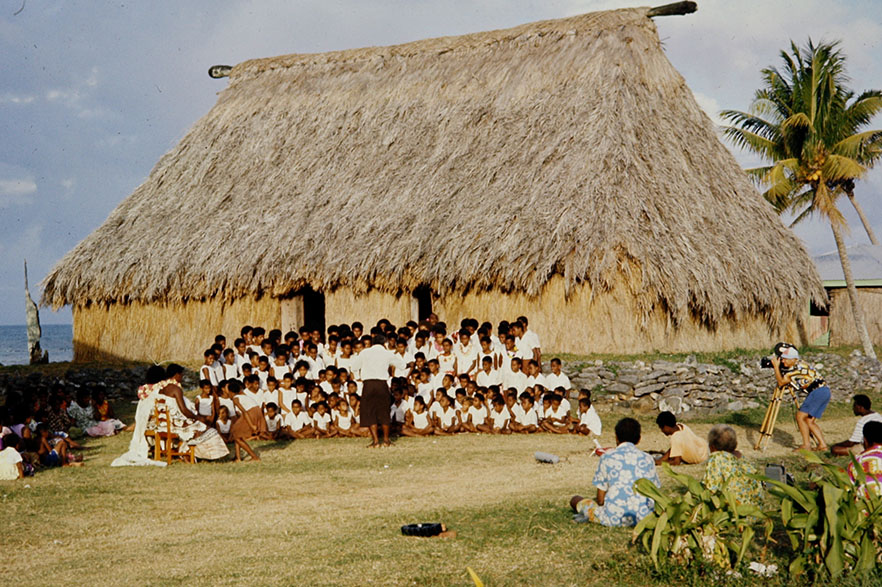
Bill Geddes behind the camera in Fiji in 1973.
Photo taken by Lew Parlette, who was mentored by and served as field assistant to Professor Geddes on the film Island of the Red Prawns, filmed in Vatulele Island, Fiji 1973.
Executor of the Geddes' estate and former student of Professor Geddes, Nescha Teckle, says Professor Geddes “believed in the power of anthropology and the social sciences as a force of good in bringing cross-cultural understanding and perspectives.”
Ngaere Geddes (née Te Punga) was born in Halcombe, New Zealand in 1928. She graduated from Teachers' Training College in Wellington and held various primary school teaching posts in New Zealand and Australia.
The couple's paths first crossed in 1956, when the President of the Chinese Cultural Association invited a group of well-known social and cultural figures from New Zealand on a one-month tour of China. The delegation comprised artists, a farmer, a Presbyterian minister, a museum director, a historian, an anthropologist (Bill) and a primary school teacher (Ngaere). The pair fell in love during the tour, and in 1959 Ngaere joined Bill in Sydney. They married in 1963.
So began a life of shared travel, work, interests and friendships. From the late 1950s to the mid-1980s, the couple undertook extensive fieldwork throughout the Pacific and Southeast Asia, living and working in Thailand, Fiji, Borneo, Bali and India. Between 1957 and 1962, they travelled and intermittently lived and worked among the ethnic minorities of northern Thailand.
Otago's Director of Development and Alumni Relations, Shelagh Murray, says the University is deeply grateful for this very generous gift.
Conference and reunion to celebrate 150 years of Law at Otago
Save the date: Thu 13 – Sat 15 April 2023
In 2023 the Otago Faculty of Law will celebrate 150 years of law teaching and study at Otago. The University's first law lecturer was Sir Robert Stout, who started teaching in 1873, just two years after the University opened. Sir Robert went on to become Prime Minister and Chief Justice.
As well as being the first university in New Zealand to teach law, Otago was the first university in Australasia to admit a woman law student, Ethel Benjamin, who enrolled in 1893 and graduated in 1897.
To celebrate the proud history of law at Otago and to gather with friends and colleagues, the Faculty is holding a conference, reunion and social events in Dunedin the week after Easter in 2023.
In conjunction with the event, a 30-year reunion of past and present members of Te Roopū Whai Pūtake (the Māori Law Students' Association) is also planned.
“The event will enable us to celebrate the past, give alumni the opportunity to recall their days at Otago, give us all an opportunity to reflect on the present and get ready for the next 150 years of Law@Otago,” says Dean of Law, Professor Shelley Griffiths.
“It will give us the opportunity to get back in a room together, to catch up with old friends, make new ones, hear some interesting and spirited reflections on the law and have fun. We look forward to welcoming friends and colleagues.”
Further information can be found at otago.ac.nz/law150. A fundraising campaign for student scholarships and to support research is also planned.
To update your contact details with the Alumni office email: database.alumni@otago.ac.nz. Please send any ideas or offers of support to the organiser: john.dawson@otago.ac.nz or law@otago.ac.nz

